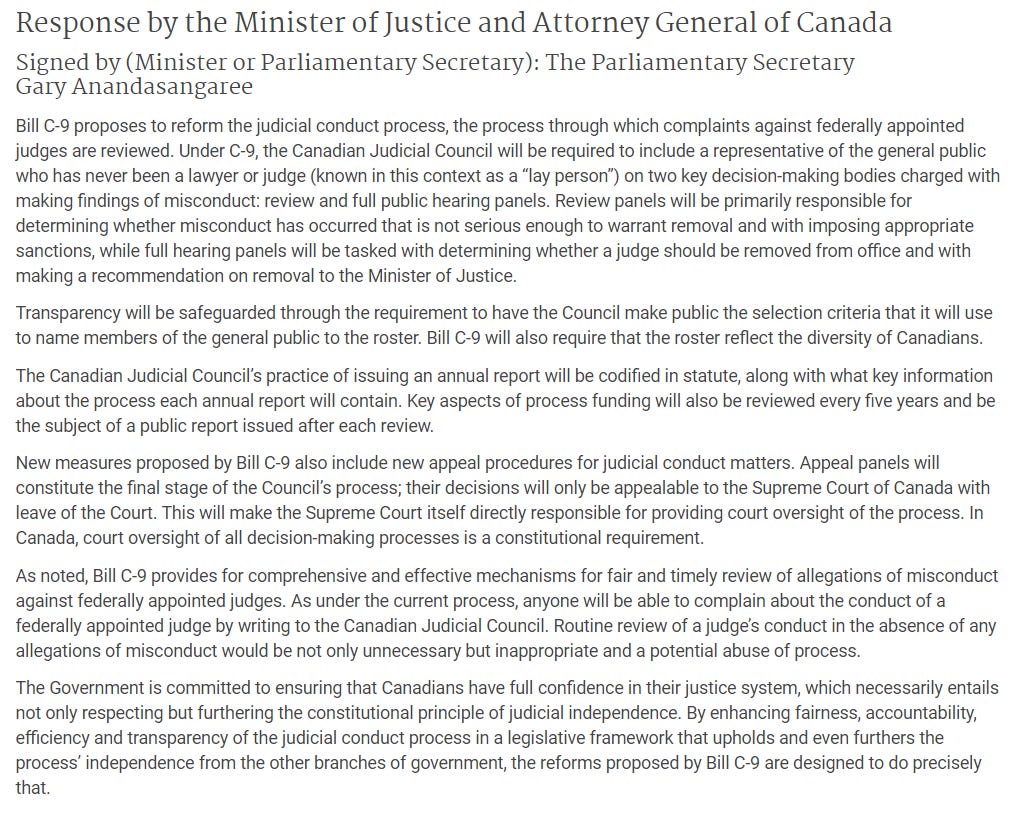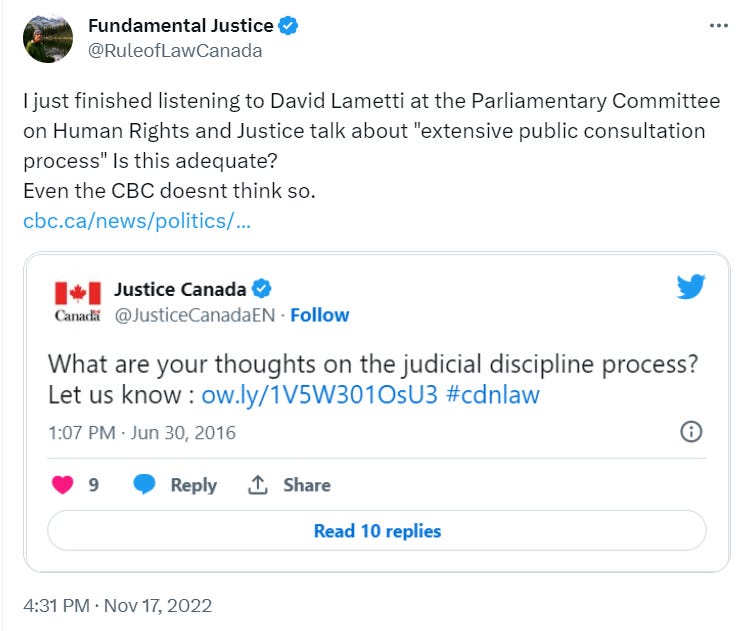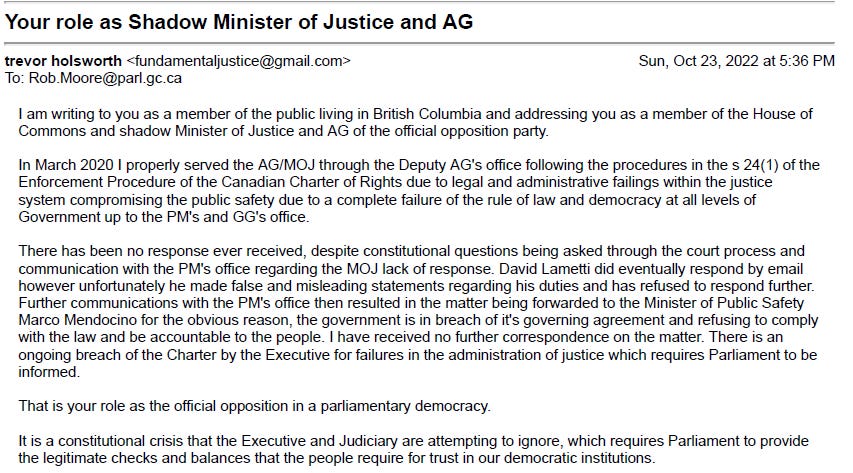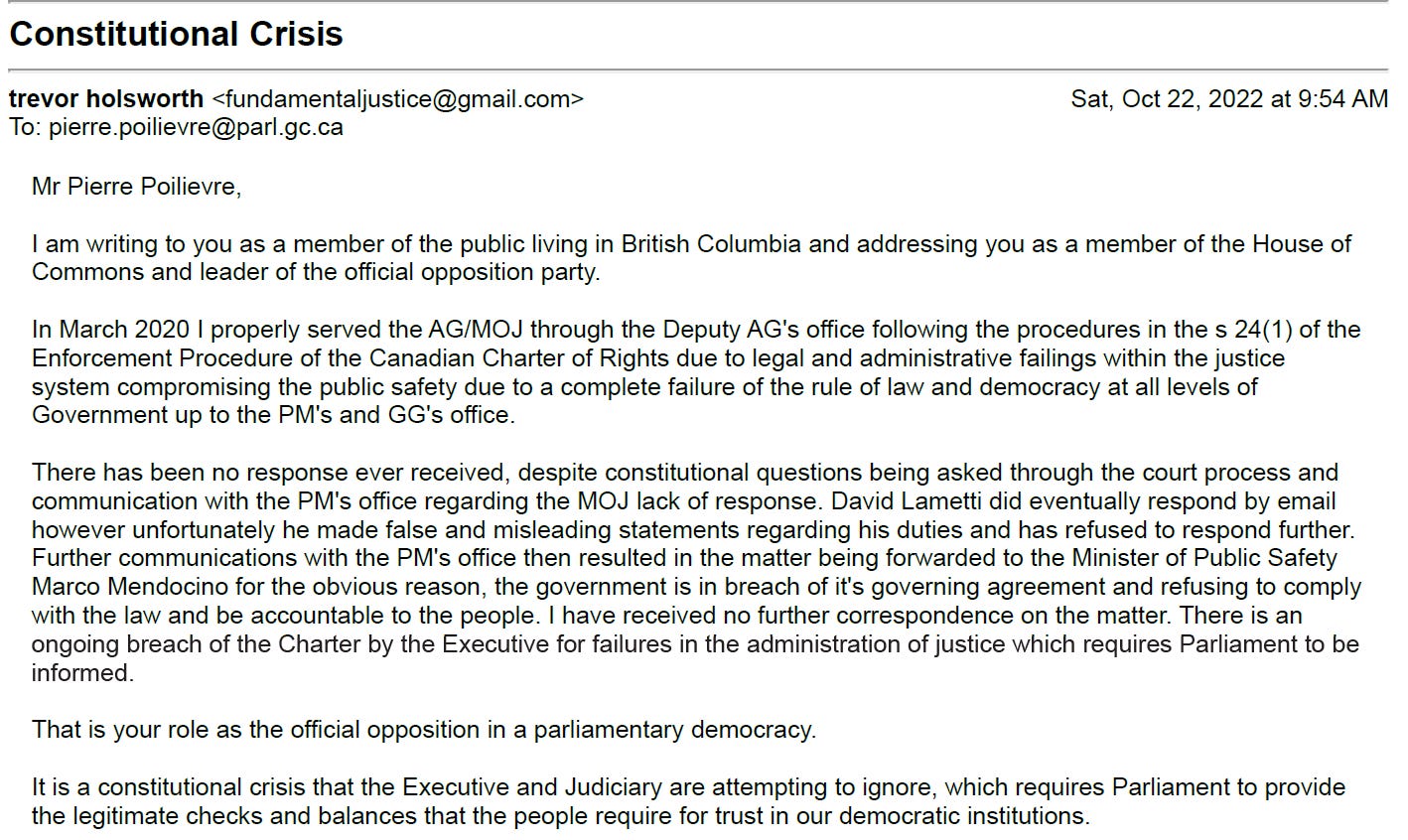Petitioning the House of Commons
including communications with the Minister of Justice, Prime Minister Justin Trudeau and the Governor General.
In a Representative Democracy our Member of Parliament purports to represent the interests of their constituents, the People of Canada.
On Sept 5th 2019 I wrote to My local Member of Parliament, Richard Cannings NDP,
“I made a complaint to the Canadian Judicial Council regarding a judge accepting the hearsay evidence of what a judge said over my evidence, the official transcript of trial. The Canadian Judicial council responded saying it was a matter of judicial discretion and not a matter of judicial conduct. Sounds a lot like a proposal to accept arbitrary justice to me which mankind has been fighting since the beginning of time. Let me know how the champions of justice, the Canadian legal system and protectors of the Canadian Charter of Rights resolve this situation. At this point I am firmly of the understanding that I have zero rights in Canada.”
I followed up with more detailed communications but ultimately their office declined to be involved so I was pretty disappointed when I saw this during the debate for the Judges Act in the House of Commons.
There was a Parliamentary Petition sponsored by Green Party Candidate Jenica Atwin and I communicated directly with her in support and to provide reasons for the importance of Parliament to be informed.
I did get confirmation of receipt and encouragement to run for the Green Party, initially I requested to run against Minister of Justice David Lametti in Laval, QC but settled for attempting to gain support at the local Green Party level. I did however communicate directly with all of the Candidates running against Lametti. I learnt a bit about the process for running as an MP but did not succeed in the nomination process which of course was a bit of a blessing in disguise as the Green Party was in “woke freefall” at the time with Leader Annamie Paul suing her own Party alleging racism. Then this happened.
Another MP was contacted and we worked again getting public signatures but since it was a repeat effort only 814 signatures were obtained.
The Petition was presented to Parliament
The response from the Minister of Justice was tabled in Parliament 45 days later stating that Bill C-9 amending the Judges Act is the solution that addresses the concerns of the Public.
Sounds pretty nice, however The Minister of Justice didnt disclose that his office was refusing to respond to the Enforcement Procedure of the Charter.
24. (1) Anyone whose rights or freedoms, as guaranteed by this Charter, have been infringed or denied may apply to a court of competent jurisdiction to obtain such remedy as the court considers appropriate and just in the circumstances.
The only Court of competent jurisdiction to judge the judges who judge the judges is Parliament. I have currently lost most of my legal rights except obviously my right to life but I am in fear of losing that. I am hereby applying to Parliament for the protection of my charter of rights. Obviously urgency is of prime importance.
A continuing theme that will run through the debate on the Judges Act is the degree of public consultation that was conducted given that the justice system in a democracy is supposed to be a Public Service. This was the Tweet back in 2016 on the Friday afternoon before the Canada Day long weekend that represented the entire effort conducted by the Justice Department to poll the Public.
The importance of petitions as a method for the public to communicate with those that purport to rule over them both in Parliament and the Judiciary has a long pedigree at least to the time of the Magna Carta when on June 15, 1215, in a field at Runnymede, King John affixed his seal to Magna Carta. Confronted by 40 rebellious barons, he consented to their demands in order to avert civil war
The major complaint of the Magna Carta was a fight against absolute power over justice claimed by the King and a refusal to pay taxes unless their demands were met.
I was also preparing legal argument for a series of legal disputes to see if the Judiciary would attempt to internally regulate as The Minister of Justice Anne McLellan requested they be allowed to do when she pleaded with Parliament not to dismiss the Judge that was the subject of my initial complaint to the Canadian Judicial Council on another matter a couple years earlier in on Feb 1999.
“let me quote the Attorney General of British Columbia who has charge of the administration of the Criminal Code: “We need to let the process work itself out while assuring Canadians across the country that issues around investigations and the crown laying charges will continue as they usually do”.
There was a wide ranging debate in Parliament with Val Meredith of the Reform Party claiming “the Minister of Justice is misleading Canadians.” but ultimately the debate ended with almost all MP’s falling into line with the Minister of Justice and ended with
The proposal for reform of the Judges Act under Bill C-9 was presented to Parliament on Dec 16, 2021. I wanted to be sure that Parliament was well informed and so on September 20th, 2022 communicated with the Committee on Justice and Human Rights in the House of Commons as they were debating the Minister' of Justice proposal.
Only a small portion of the brief that I provided was posted. The correspondence that I had with the Parliamentary Ethics Commissioner Stephane Dion on the 27th May 2021 accepting my complaint regarding the MOJ refusal to respond to the Enforcement Procedure of the Charter was not.
Unfortunately further communication was not forthcoming and ultimately Stephan Dion resigned his position in the face of continuous and ongoing ethical violations ranging from the SNC Lavelin affair, WE Charity Scandal, “Cash for Access” and the Chinese Election Interference amongst many others.
My communications with the Parliamentary Committee on Justice and Human Rights included emails attempting to communicate with the Minister of Justice
On September 20th, 2020 I wrote, quoting from the Attorney General’s principles guiding charter challenges which states
"The Charter is part of the supreme law of Canada, and any law or government decision inconsistent with it is of no force or effect. Both in the provision of legal advice and in litigation, the Attorney General demonstrates the greatest possible commitment to respecting constitutional rights."
“I cannot see how the complete absence of communication on this issue is respecting my constitutional rights. It certainly does not demonstrate trust and good faith. I know that it is a difficult issue but government should act in good faith with the citizens and not stonewall a difficult issue. Of course I will stand my ground on this issue forever until resolved. I am making the issue public and will confront the issue at every court hearing that I am forced against my will to attend.”
I wrote to the PM's office on Nov 15, 2020,
“I have been attempting to communicate with the Attorney General of Canada, Mr David Lametti regarding problems with the administration of justice and getting zero response. There is a substantial breach in fundamental justice in the administration of Justice which poses a problem for all Canadians. The Canadian Judicial Council claims that federal judges have discretion to disregard the transcript of trial if they wish, like if they have the evidence of the plaintiff testimony on what she heard the judge say 6 months previously. I have pointed out to the CJC and to the Attorney General the problems that this has with 'fair and impartial' and 'fundamental justice'. The desire to protect ones colleagues is of course admirable however when it compromises every ethical position it causes more damage than resolving the situation. I have submitted a charter of rights claim, it has been received ( but ignored ) and requested that parliament to resolve the situation of judges claiming constitutional authority that does not belong to them.”
On November 18th 2020 I received a response.
I responded immediately,
On November 25th 2020 I followed up with another email to the PMO
That generated a reply from the Minister of Justice David Lametti on Feb 11th, 2021
“I recognize that you are dissatisfied with the CJC’s disposition of your complaint. However, to ensure respect for the fundamental principle of judicial independence, it would not be appropriate for me to intervene with the CJC on your behalf, nor, as a matter of law, would it be possible for me to do so. While I note your concerns, I have every confidence in the CJC’s capacity to deal effectively and appropriately with all matters that fall within its statutory mandate.”
I responded on Feb 14, 2021
“There have been numerous attempts to contact you through your office as well instances where communications have been blocked so that elected officials do not receive the appropriate communication. I am not sure what communications that you have received. It appears that you have received my Charter of Rights application as served to the Deputy Attorney General. I am not sure if you are currently in possession of the United Nations Human Rights complaint that I made on behalf of all Canadians because your office ignored the Charter of Rights application. It may help our understanding if you could confirm the communications that you have received. In the spirit of open government, I have previously requested that ALL communications dealing with this matter, include me.”
and then disputed the Minister of Justice’s opinion,
“You cannot possibly have "every confidence in the CJC's capacity to deal effectively and appropriately with all matters that fall within its statutory mandate" when
a) the CJC is claiming that Judges are above the law - that their word can overrule the official transcript, which contravenes The Rule of Law as well as Fundamental Justice as required by the Charter of Rights.
b) whilst the CJC has previously maintained that their decisions are not open to appeal that was altered in 2019 by the federal court and the CJC was stated by that court to be "abusive" in the treatment of a judge. If the court finds the CJC abusive in the treatment of a fellow judge how can a regular citizen of Canada expect better treatment?
c) The CJC itself is asking for more clarification on its powers from Parliament.”
and disputed his false and misleading statement, “ it would not be appropriate for me to intervene with the CJC on your behalf, nor, as a matter of law, would it be possible for me to do so.”
“In regards to your statement that you have no legal right to pursue the action that I propose I refer you to The Ministry of Justice website, (https://www.justice.gc.ca/eng/cons/fjdp-pdmf/3.html#sec311)
"Possibilities for further reform of the Federal Judicial Discipline Process Department of Justice Canada, JUNE 2016
’The Minister is not bound by the CJC’s recommendation; the option to seek a judge’s removal by Parliament exists whether or not the CJC recommends that the judge be removed. ...... The roles of the Minister of Justice and of Parliament at the end of the judicial discipline process are critical. As noted, Parliament’s role as the body tasked with actually removing a judge from office is set out in s. 99(1) of the Constitution Act, 1867’”
I received no further communication from the Minister of Justice, and denial by the Judiciary that anything in the conduct of the AG/MOJ was a problem. But in the face of this evidence presented to the House of Commons Bill C-9 made it through the 4 sittings of the committee on November 17, 21, 24 and December 1st 2022 without a mention of the contents of my brief.
I had applied to present evidence in person and although my application went through on the same day as another’s I was not selected. I had no physical, racial or sexual qualities that would demonstrate “inclusiveness”. I only had the Minister of Justice obstructing justice and it appeared that nobody was interested in the slightest.
The members of the Committee included:
1. Randeep Sarai, Chair, Liberal, a lawyer
2. Rob Moore, Shadow Minister of Justice, Conservative, a lawyer
3. Rhéal Eloi Fortin, Block Quebecois, a lawyer
4. Gary Anandasangaree, Liberal, “an internationally recognized human rights lawyer and community activist who has advocated tirelessly for education and justice…regularly representing Lawyers’ Rights Watch Canada at the United Nations.”
5. Élisabeth Briere, Liberal, Notary
6. Larry Brock, Conservative, Lawyer ( former crown prosecutor)
7. Frank Caputo, Conservative, Lawyer ( former crown prosecutor and instructor at TWU)
8. Anju Dhillon, Liberal, Lawyer (first Canadian Sihk to practice law in Quebec)
9. Lena Metlege Diab, Liberal, Lawyer
10. Randall Garrison, NDP, Degree in Political Science, Instructor Criminal Justice.
11. Yasir Naqvi, Liberal, Lawyer and former Ontario AG (2016-2018) “Naqvi was born and raised in Karachi, Pakistan and immigrated to Canada with his family after his father was jailed for nine months for leading a pro-democracy demonstration”
12. Tako Van Popta, Conservative, Lawyer “McQuarrie Hunter LLP for over 30 years, Managing Partner, becoming one of the largest law firms south of the Fraser”
Who is protecting the Public Interest?
6 Liberal, 4 Conservative, 1 NDP, 1 Bloc: All lawyers.
Doctrine of Separation of Powers
“All would be lost if the same man or the same ruling body, were to exercise these three powers, that of law making, that of the executing the public resolutions, and that of judging crimes and civil causes.”
Montesquieu, The Spirit of Laws 1748
Rob Moore is as a member of the loyal opposition, the Shadow Minister of Justice I wrote him directly, no response was ever received.
Larry Brock, former crown prosecutor had a cross examination style of questioning with witnesses from the public, including this memorable exchange:
”I did a little bit of research on your background, sir, and I understand that the National Post has proclaimed you “a self-appointed citizen watchdog” of the CJC. I understand that, in one of your blog posts, you've opined that Parliament has a unique opportunity “to create an entity fully independent from both the judiciary and the executive branch to receive complaints and decide how to respond to them”.
In your opinion, “this is the right solution. It always has been.”
In your view, the fundamental problem with the CJC is that “judges judging judges doesn't work…
I would like to hear from you, knowing full well that this bill is going to pass and receive royal assent shortly can you offer any opinion, any suggestion that we can consider.”
Response: “that the screening is not done by the Canadian Judicial Council”
There were also excellent submissions provided to the Committee from University Law Professors Richard Devlin, author of several books on Judicial Ethics and Scott Craig who related personal experience dealing with the Canadian Judicial Council both of which are worth separate detailed readings. Mr Devlin presents again in the Senate and his work is acknowledged, admired and ignored completely once again.
https://www.ourcommons.ca/Committees/en/JUST/StudyActivity?studyActivityId=11897428
"There is no better known rule of natural justice than the one that a man shall not be a judge in his own cause."
House of Lords, Pinochet
It should not be forgotten that senior lawyers termed Benchers, judge the conduct of other lawyers conduct in the provincial law societies in a very similar way as the proposed judges act with little to no external oversight, except potentially Parliament, and with the “public trust” as their statutory duty. There has been significant conflict exposed including theft of funds in trust accounts, fraud and other violations of the public trust and these appear to be seen as just part of the risk that the public runs in working with lawyers.
Let’s not forget that Judges are filled from the ranks of lawyers by the Minister of Justice. Magically the once partisan and ethically suspect “how can we tell a lawyer is lying - when their lips are moving” lawyers, become impartial judges with the qualities of “virtually irreproachable conduct”.
In Court the Judges then judge the argument and conduct of the government whom they claim to be “independent” from, as well as lawyers, police, corporations, rich and not so rich people with lawyers and at the very bottom, the self represented litigant who brings no money to the table.
On May 29, 2021 the CBC published,
“Justice minister accidentally tweets that one of his campaign donors will become a judge…David Lametti's office says the Twitter announcement was sent in error”
”As a reminder: donors to the Liberal Party account for roughly 0.25% of adult Canadians but a little over 33% of federal judicial appointees”
Andrew Coyne
In the case of Judges for the Supreme Court of Canada the PM appoints
To complete my letter writing campaign I sent this letter to Pierre Poillevre, the leader of the Conservative Party and the loyal Opposition in the House. No response ever received.
The circumstances behind the NDP - Liberal Party “confidence and supply agreement” I addressed with an email to leader of the NDP, another lawyer, Jagmeet Singh. No response ever received.
I had written a couple of letters to the PM’s office but little resolution and no responses beyond forwarding to the Minister of Justice and Minister of Public Safety who didnt respond.
Paul Forsyth of the Reform Party on Feb 2nd 1999 summarized the situation in relation to another matter quoting Liberal MP, Shaughnessy Cohen, “In the final analysis who is on the hook if a judge screws up? It is the Prime Minister and the Justice Minister”
I presented the problem to the former BC Attorney General and current Premier and received a reply that he had no authority to deal with the matter.
A month prior to the NDP - Liberal Party “confidence agreement” I had written to the Governor General of Canada, quoting from Peter Hogg’s Constitutional Law of Canada. I received no response.
“The Governor General has certain “personal prerogatives” or “reserve powers” which he or she may exercise upon his or her own personal discretion. Whereas in the exercise of governmental powers generally the Governor General must act in accordance with the advice of the Prime Minister or cabinet, there are some occasions on which he or she may act without advice, or even contrary to advice.
The definition of those occasions when the Governor General may exercise an independent discretion has caused much constitutional and political debate. But it is submitted that the basic premise of responsible government supplies the answer: so long as the cabinet enjoys the confidence of a majority in the House of Commons, the Governor General is always obliged to follow lawful and constitutional advice which is tendered by the Cabinet.”
“Dismissal of Prime Minister
The second reserve power of the Governor General is the power to dismiss the Prime Minister. The dismissal of a prime minister automatically involves the dismissal of the entire ministry.”
“When does the power of dismissal arise?…..Could the Governor General dismiss a ministry because he or she believed its policies to be illegal?
I communicate with you with respect for the powers of your office to compel a Government to operate within the rule of law and the constitution. I should not have to have taken this message this far, but I will go further if necessary.”
The Liberal Party did not hold the confidence of a majority in the House of Commons but with the support of the NDP, now they did. But was it in the Public Interest?
Bill C-9 was passed on Dec 9th, 2022 in the House of Commons and moved to the Senate.
I left this message with the House of Commons with both the Speaker of the House, Anthony Rota who responded in acknowledgement of receipt, and the Standing Committee on Procedure and House Affairs, who did not.
I will continue the story with the debate in the Senate in another Chapter.































